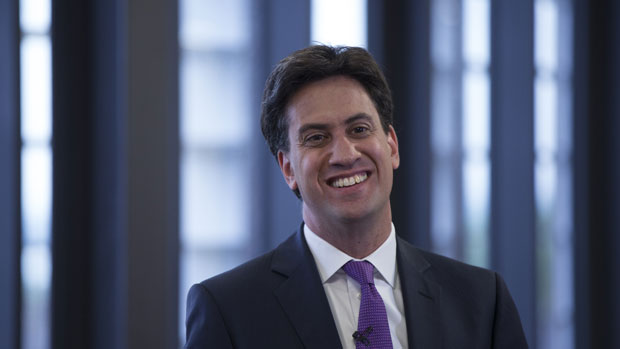Miliband's Wallace speech: best defence against Tory attacks?
Labour felt it had to erect 'Iron Dome' against personal attacks being planned by Tory HQ

A free daily email with the biggest news stories of the day – and the best features from TheWeek.com
You are now subscribed
Your newsletter sign-up was successful
Ed Miliband’s 'Wallace' speech – as in "I am not from central casting. You can find people who are more square-jawed, more chiselled, look less like Wallace" - has been criticised for simply drawing attention to his defects.
But Labour strategists are satisfied that it has done the job intended: namely, to act as Labour’s 'Iron Dome' against incoming attacks launched by David Cameron’s Australian political strategist Lynton Crosby and the Tory high command.
Miliband was alerted to the threat last week that the Tories were planning a campaign of personal attacks on Miliband’s personal appearance and foibles, on his unfitness for office and on Labour’s lack of economic responsibility.
The Week
Escape your echo chamber. Get the facts behind the news, plus analysis from multiple perspectives.

Sign up for The Week's Free Newsletters
From our morning news briefing to a weekly Good News Newsletter, get the best of The Week delivered directly to your inbox.
From our morning news briefing to a weekly Good News Newsletter, get the best of The Week delivered directly to your inbox.
Rachel Sylvester, the Times commentator, wrote that Michael Gove – the former Times colleague who was demoted from Education Secretary to Chief Whip in the recent reshuffle– was uncomfortable with the proposed attacks.
"The personal attacks on Mr Miliband being planned will make him uncomfortable — and in his view only reinforce his party’s 'nasty' image," she said. "He was horrified by the Eastleigh by-election campaign, which presented the Tory candidate, Maria Hutchings, a mother of four who is passionate about special educational needs, as a narrow Eurosceptic obsessed by immigration."
In his 'Wallace' speech on Friday, Miliband said: "If you want a politician who thinks that a good photo is the most important thing, then don't vote for me." He added: “The current Prime Minister might take a good picture but he can’t build a country that works for you. It is not what interests him.”
Andrew Rawnsley, the Observer commentator and a close friend of the Blairites at the top of the Labour party, gave Ed's speech the thumbs-down yesterday, warning that Miliband’s likeness to the goofy, cheese-eating Wallace or his “struggles with bacon butties" were not the central reason why he has such poor ratings as a potential prime minister.
A free daily email with the biggest news stories of the day – and the best features from TheWeek.com
"That," said Rawnsley, "has much more to do with the problem that his speech conspicuously did not confront: the widespread belief, fair or not, that he can't take tough decisions and the lack of confidence in Labour as a team that can be trusted with the economy.”
But is Rawnsley right? Stefan Stern of the leftie Labour List website blogged: “It will now be just a bit harder – but only a bit – for the lobby and broadcasters to run endless pieces about Miliband’s appearance and demeanour.”
Meanwhile, an organisation of Conservative women has warned Lynton Crosby that mocking the Labour leader for personal foibles will only backfire and put female voters off backing the Tories in May 2015. The Observer quoted Niki Molnar, national chair of the Conservative Women's Organisation, saying women in particular were "put off when elections descend into identity politics".
Whether Tory high command will take the women's advice is doubtful. Party strategists appear to believe the Tories must play nasty in order to stop Miliband becoming prime minister by – as they see it – default.
They have three fears:
Fear One is that Ukip will split the Tory vote and let Labour in. As the Daily Telegraph reports today, Labour’s election campaign team has persuaded Miliband that Ukip gains are good for Labour’s prospects. That means Labour could go easy on Ukip in the election campaign.
Fear Two is that Labour's in-built advantage of up to 20 seats due to the quirks of constituency boundaries will make the difference and hand Miliband victory. (In a nutshell, Tories argue that many urban seats – where Labour traditionally scores well – are less populated than rural seats, where the Conservatives are more likely to succeed: which means that Labour needs fewer votes across the country to win a Commons majority.)
Fear Three is that improving UK growth, and being considered by voters to be generally "safer" on managing the economy, won’t be enough for the Tories to hold on to power. In 1997, Labour trailed the Conservatives by seven points on "managing the economy" but still won the 1997 general election.
More cheese, Wallace?
-
 Who is Keir Starmer without Morgan McSweeney?
Who is Keir Starmer without Morgan McSweeney?Today’s Big Question Now he has lost his ‘punch bag’ for Labour’s recent failings, the prime minister is in ‘full-blown survival mode’
-
 Why the Gorton and Denton by-election is a ‘Frankenstein’s monster’
Why the Gorton and Denton by-election is a ‘Frankenstein’s monster’Talking Point Reform and the Greens have the Labour seat in their sights, but the constituency’s complex demographics make messaging tricky
-
 The Mandelson files: Labour Svengali’s parting gift to Starmer
The Mandelson files: Labour Svengali’s parting gift to StarmerThe Explainer Texts and emails about Mandelson’s appointment as US ambassador could fuel biggest political scandal ‘for a generation’
-
 Reforming the House of Lords
Reforming the House of LordsThe Explainer Keir Starmer’s government regards reform of the House of Lords as ‘long overdue and essential’
-
 How long can Keir Starmer last as Labour leader?
How long can Keir Starmer last as Labour leader?Today's Big Question Pathway to a coup ‘still unclear’ even as potential challengers begin manoeuvring into position
-
 Three consequences from the Jenrick defection
Three consequences from the Jenrick defectionThe Explainer Both Kemi Badenoch and Nigel Farage may claim victory, but Jenrick’s move has ‘all-but ended the chances of any deal to unite the British right’
-
 The high street: Britain’s next political battleground?
The high street: Britain’s next political battleground?In the Spotlight Mass closure of shops and influx of organised crime are fuelling voter anger, and offer an opening for Reform UK
-
 The MAGA civil war takes center stage at the Turning Point USA conference
The MAGA civil war takes center stage at the Turning Point USA conferenceIN THE SPOTLIGHT ‘Americafest 2025’ was a who’s who of right-wing heavyweights eager to settle scores and lay claim to the future of MAGA

